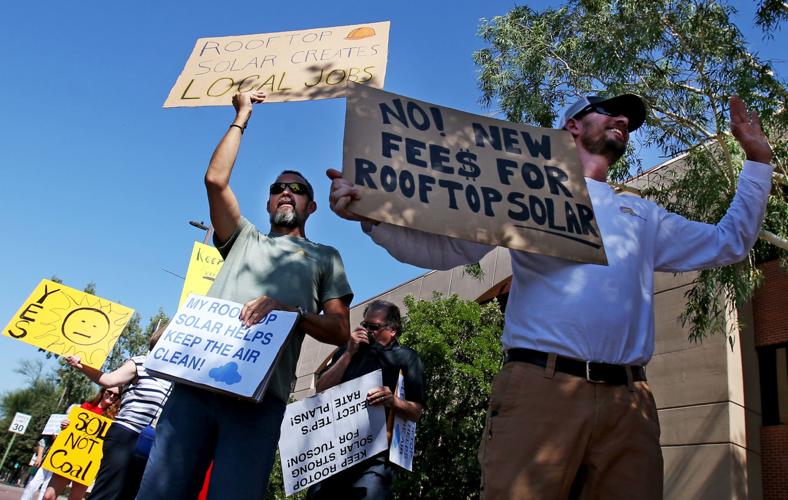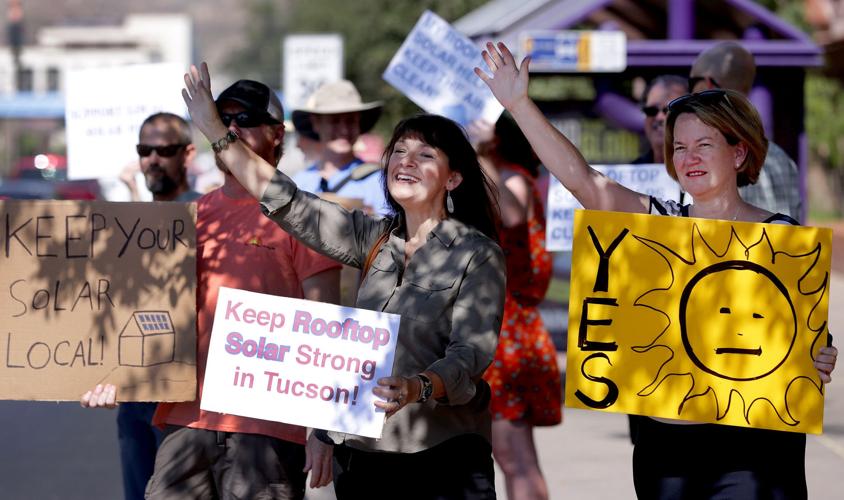A proposal to reduce reimbursements for future Tucson Electric Power Co. solar customers drew a standing-room only crowd at an Arizona Corporation Commission public comment hearing Monday.
And while most of the TEP customers who spoke derided TEP’s proposal as anti-solar, TEP got support from at least one customer and several business groups who said solar rate reform is needed to eliminate a cost shift to customers without solar.
TEP’s plan would cut reimbursements to customers for excess energy their rooftop solar arrays provide and add new demand charges and meter fees, reflecting a Corporation Commission decision to discontinue net metering or reimbursement at the full retail rate.
Several opponents of TEP’s plan cited the need to support rooftop solar to get away from fossil fuels that contribute to global warming.
“Climate change is real, and the Southwest is one of the areas most affected by this, along with the poles,” said Don Ries, a TEP customer with a rooftop solar system.
Ries said that, with advancing energy-storage technologies, solar will become an increasingly valuable part of the nation’s power grid.
“It’s here, it’s growing, and we should be embracing it, not fighting it,” Ries said.
TEP midtown customer Victoria Woodard said she is paying about $10 to $15 more a month with the solar array she leases from Solar City, but she believes it’s part of her contribution to save the environment from the health effects of burning fossil fuels.
She rejected the contention by TEP and other utilities that solar customers are being subsidized by others.
“The idea that solar customers are hurting other customers is just a divide-and-conquer strategy by TEP, in my opinion,” Woodard said.
TEP’s plan is being considered along with a solar proposal for UNS Electric, a sister company to TEP that serves Santa Cruz and Mohave Counties.
Marshall Magruder, a Tubac resident and UNS customer who has testified in other rate matters before the commission, said Monday that solar’s role in reducing demand during hot summer days is overlooked.
“It reduces the peak demand during the day — there is no subsidy here,” he said.
One current TEP rooftop solar customer said he supports the solar rate changes.
Mark St. Onge said though he’s benefited from net metering, there is no longer any need for such “subsidies.”
“I got a great deal, but the deal I got is not something that is sustainable for an electric utility,” he said.
Solar industry representatives said TEP’s proposed changes would drastically extend the time is takes for rooftop solar customers to recoup their investments.
Kent Bauman, a solar consultant, said TEP’s proposal would eliminate most of the incentives for customers to invest in their own solar arrays in the future.
Bauman estimated that TEP’s proposals would stretch the time it takes a typical residential photovoltaic system to pay for itself through savings to more than 10 years, from about 5 to 7 years under the current rates.
TEP has proposed paying new rooftop solar customers a solar export rate of 9.7 cents per kilowatt-hour, based on the cost from utility-scale systems, compared with current full-retail net metering rate of about 11.5 cents.
The utility also has proposed new grid-access and demand charges and a $4 meter-reading charge for solar customers.
The changes would not affect customers who already have grid-connected solar systems and would apply to those who apply to interconnect after the effective date of the new rates.
Representatives of several business groups said the solar rate reforms are needed.
Garrick Taylor, senior vice president of government relations for the Arizona Chamber of Commerce & Industry, said his group, the Tucson Metro Chamber and the Tucson Hispanic Chamber of Commerce have signed a letter supporting TEP’s solar rate proposal.
The Southern Arizona Leadership Council — a 140-member group of business leaders — also backed TEP’s plan.
James Voyles, senior director and policy counsel for the Consumer Energy Alliance, said his group supports TEP’s plan because it will result in more equitable rates, citing the lower cost of large, utility-scale solar farms.
The Consumer Energy Alliance touts 400,000 individual members but lists corporate members including major oil and gas companies, utility groups, chambers of commerce, unions and major manufacturers.
“It advances solar at rates that work for everyone,” Voyles said of TEP’s plan.
Tom Jenney of Phoenix said current Arizona’s current net-metering rules result in a huge “net subsidy” to rooftop solar customers that could otherwise go to creating more jobs.
“You end up transferring wealth from another part of society that is out there creating jobs,” Jenney said.
Jenney’s comments were not surprising. Though he didn’t identify his employer, Jenney is director of the Arizona chapter of Americans for Prosperity, a conservative political action group founded by the Koch brothers.
The next step in the TEP case is evidentiary hearings that occur before a hearing judge makes a recommendation to the full Corporation Commission — a process now likely pushed into early fall.





